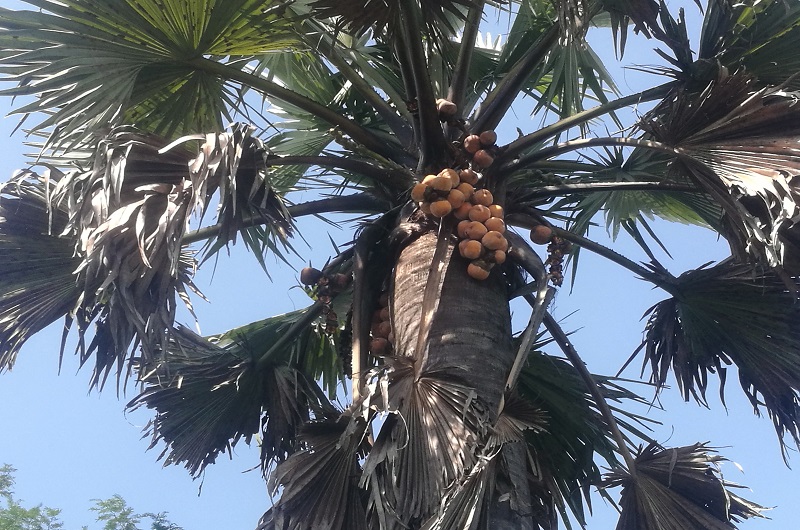
The vital need to protect the African Fan Palm: A nutritious lifeline at risk
- AgricultureFEATUREDNEWS
- June 7, 2024
- No Comment
BY Andrew Cohen Amvesi
WEST NILE: In the West Nile subregion of Uganda, the African Fan Palm, also known as the Toddy Palm or Borassus Aethiopum, stands as a crucial pillar of the rural economy.
This versatile plant, referred to locally as “Itu,” offers a wealth of resources for food, construction, traditional medicine, and crafts.

Despite its significance, the African Fan Palm is facing alarming depletion due to human activities, threatening its survival and the myriad benefits it provides.
A Multi-Purpose Lifesaver

The African Fan Palm is deeply woven into the daily lives of the West Nile communities. Its fruits and shoots are not just delicacies but vital food sources, especially during periods of drought and famine. The leaves, stems, and other parts of the palm are indispensable in construction, craft-making, and traditional medicine.

However, this extensive utilization has placed significant pressure on the palm’s genetic diversity and overall population.
Samuel Acidri, a resident of Abira cell in Arua City, expresses his concern about the rapid depletion of the African Fan Palms in Ayivu Division.
“Whenever people buy land with African Fan Palms, they cut them down to clear the area for building houses. Later, they use the stems for fencing and the leaves as firewood. That’s why you rarely see these palms standing in our area these days,” he laments.

Acidri highlights the lack of deliberate efforts to propagate these palms, as many believe they will continue to grow naturally without human intervention.
Cultural and Economic Significance
In Terego district, Grace Ozitiru from Idrayo village shares how the African fan palm serves multiple purposes, from constructing houses and making beehives to covering pit latrines.
“We are not aware that we are depleting the African Fan Palms because they keep on growing on their own. These palms provide us with hardwood for roofing and materials for crafts like baskets and winnowing pans, which we sell to earn money,” Ozitiru explains.
The palm’s fruits are particularly cherished. Rose Buleru, a resident of Yiba village in Maracha district, recounts her fond memories of chewing the delicious African Fan Palm fruit since childhood.
She notes that many young girls sell the fruits and crafts made from the palm to earn money for essential items like sanitary pads.

Buleru emphasizes the potential for propagation and the need to encourage the cultivation of alternative fruit trees to relieve pressure on the palms.
Environmental and Nutritional Benefits
The African Fan Palm is not only a vital economic resource but also a key player in environmental conservation. Its drought-resistant properties and role in preventing desertification are invaluable in the semi-arid regions of East Africa.
The palm’s leaves, roots, and fruits are used in traditional medicine, providing treatments for a range of ailments from stomach parasites to bronchitis and asthma.
Omar Mohamud, the Koboko District Secretary for Water, Environment, and Natural Resources, stresses the importance of conserving the African Fan Palm.
He highlights its nutritional value during droughts and famines, where its seeds and buds serve as crucial food supplements.
“Today, many of our young children do not know much about these palms. They don’t understand the importance attached to them, and that is why we need to propagate and preserve the plants,” Mohamud urges.
A Call to Action
Rose Ayaka Atima, former Maracha District Member of Parliament, calls on the community to recognize the economic potential of the African Fan Palm. By adding value to its fruits and other parts, communities can benefit significantly.
“We can take the fruits, refine them to manufacture food and drinks for sale. This will add value to our diets and provide economic benefits,” she explains.
Ayaka also points out the environmental importance of preserving the palms. “People just cut the palm and abandon it to rot. We need to protect this tree species as part of our environmental conservation efforts, especially in the face of climate change,” she stresses.
The African Fan Palm is more than just a tree; it is a lifeline for many communities in West Nile. Its depletion threatens not only the biodiversity of the region but also the livelihoods and cultural heritage of its people.
Urgent measures are needed to promote sustainable use, propagation, and conservation of this vital plant to ensure its survival for future generations.
Sharon Ocola, a staff of the Mentoring and Empowerment Programme for Young Women (MEMPROW) further calls for collective action to ensure that environmental sustainability and climate action are approached wholesomely.
“At MEMPROW under the Strategic Partnership Agreement (SPAII) program, we envision a future where young people, particularly young women, are at the forefront of environmental conservation efforts in Uganda. By investing in the next generation of leaders, we are not only addressing the immediate challenges of climate change but also laying the foundation for a more resilient and sustainable future,” she explains.
She pointed out that through their dedicated work in West Nile and beyond, they are witnessing the transformative power of community-led environmental advocacy. The young women they support are becoming champions of change, driving efforts to protect and preserve their natural environment for themselves and future generations.
She calls upon other stakeholders to join them in this vital mission through partnership, support, or participation, such contributions can help expand a multistakeholder reach and impact to create a greener, more sustainable world where every individual has the opportunity to thrive.





